Airlines, Airports and Airliners 24 Oct to 6 Nov 2022
Compiled by Willie Bodenstein
Google Banner Ad
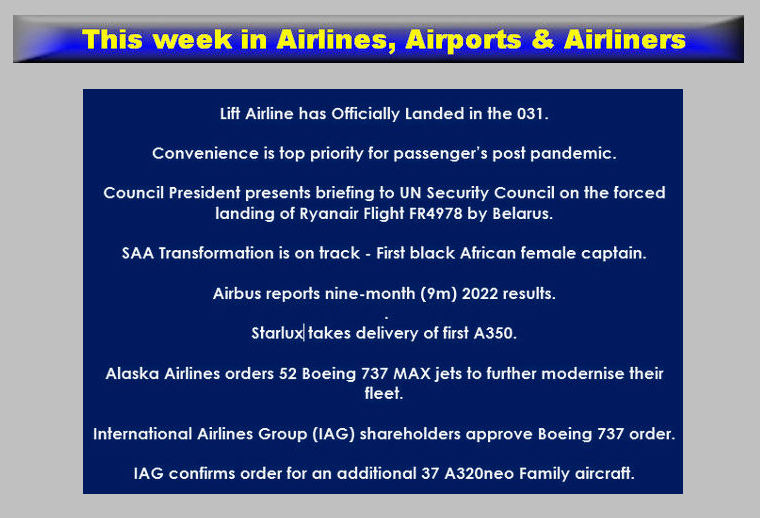
LIFT AIRLINE HAS OFFICIALLY LANDED IN THE 031.

Lift Airlines, began flights of its scheduled 3 times daily air services between Johannesburg and Durban on 26 October. The start-up airline, which was established two years ago, has grown its route network to include Durban, entering one of South Africa's most popular routes.
"The launch of Lift Airlines air services to Durban is a welcome addition to King Shaka International Airport, improving the much-needed capacity on one of South Africa's most popular routes Durban- Johannesburg.” Said Mr Siboniso Duma: MEC for Economic Development, Tourism & Environmental Affairs in KwaZulu-Natal, in a message of support. He further expressed his satisfaction with the launch of Lift Airline and noted. "As KwaZulu-Natal, we aim to continue working with our airline partners to drive sustainability and stability in the market to ensure that air travel remains accessible, for the benefit of all our stakeholders."
Domestic airlines play a significant role in driving the recovery and rebuilding efforts of South Africa's local aviation industry ensuring that it continues to benefit business and leisure travel.
Mayor of eThekwini Municipality, Cllr Mxolisi Kaunda, echoed the positive sentiments expressed around the launch by saying, "We would like to extend our warmest welcome to the new member of our family to eThekwini and wish LIFT Airlines growth and resilience that will make it a global player in the aviation sector."
He continued, "For any city to compete on a global stage, it is crucial to have a vibrant and competitive aviation industry because it facilitates international trade and drives rapid growth in tourism. We are pleased that this launch takes place at the time when the City is implementing its summer season campaign. We have no doubt that this event will contribute immensely to our efforts of attracting more than 900 000 visitors to the City during the festive season."
The CEO and co-founder of LIFT Jonathan Ayache added, “It's no secret that Durban has had its fair share of struggles over the past two years and we are just so proud and happy to play a small part in bringing back travel and tourism to such a deserving City. Durban is one of the most common requests we receive on social media and has been on our radar for a while and for that, we couldn't be more excited.”
"As of June 2022, King Shaka International Airport's traffic volumes have recovered to 56% of their pre-pandemic levels. King Shaka International Airport is one of the fastest-recovering international airports in South Africa with a majority of the traffic driven by leisure travel as well as people visiting friends and family, domestic travel has played a significant role in driving this growth. With Lift Airlines entering the market we would like to see this development stimulate travel and accelerate traffic volumes." Says Mr Hamish Erskine, CEO of Dube TradePort Special Economic Zone and Co-chair of Durban Direct.
Lift Airline has grown its fleet and has two more aircraft arriving this year.
CONVENIENCE IS TOP PRIORITY FOR PASSENGERS POST PANDEMIC

The International Air Transport Association (IATA) announced the results of its 2022 Global Passenger Survey (GPS), showing that travellers top concerns for travel in the post-COVID crisis period are focused on simplification and convenience.
“Travel during COVID-19 was complex, cumbersome and time consuming due to government-imposed travel requirements. Post-pandemic, passengers want improved convenience throughout their trip. Digitalisation and use of biometrics to speed up the travel journey is the key,” said Nick Careen, IATA's Senior Vice President for Operations, Safety and Security.
Planning and Booking
Passengers want convenience when they plan their travel and when choosing where to depart from. Their preference is to fly from an airport close to home, have all booking options and services available in one single place, pay with their preferred payment method and easily offset their carbon emissions.
Proximity to the airport was passengers' main priority when choosing where to fly from (75%). This was more important than ticket price (39%).
Travellers were satisfied being able to pay with their preferred payment method which was available for 82% of travellers. Having access to planning and booking information in one single place was identified as being top priority.
18% of passengers said that they offset their carbon emissions; the main reason given by those that did not was that they were not aware of the option (36%).
“Today's travellers expect the same online experience they get from major retailers like Amazon. Airline retailing is driving the response to these needs. It enables airlines to present their full offer to travellers. That puts the passenger in control of their travel experience with the ability to choose the travel options that they want with convenient payment options,” said Muhammad Albakri, IATA Senior Vice President Financial Settlement and Distribution Services.
Travel Facilitation
Most travellers are willing to share their immigration information for more convenient processing. 37% of travellers said they have been discouraged from traveling to a particular destination because of the immigration requirements. Process complexity was highlighted as the main deterrent by 65% of travellers, 12% cited costs and 8% time.
Where visas are required, 66% of travellers want to obtain a visa online prior to travel, 20% prefer to go to the consulate or embassy and 14% at the airport. 83% of travellers said they would share their immigration information to speed up the airport arrival process. While this is high, it is slightly down from the 88% recorded in 2021.
“Travellers have told us that barriers to travel remain. Countries with complex visa procedures are losing the economic benefits that these travellers bring. Where countries have removed visa requirements, tourism and travel economies have thrived. For countries requiring certain categories of travellers to get visas, taking advantage of traveller willingness to use online processes and share information in advance would be a win-win solution,” said Careen.
Airport Processes
Passengers are willing to take advantage of technology and re-thought processes to improve the convenience of their airport experience and to manage their baggage.
Passengers are willing to complete processing elements off-airport. 44% of travellers identified check-in as their top pick for off-airport processing. Immigration procedures were the second most popular “top-pick” at 32%, followed by baggage. 93% of passengers are interested in a special program for trusted travellers (background checks) to expedite security screening.
Passengers are interested in more options for baggage handling. 67% would be interested in home pick-up and delivery and 73% in remote check-in options. 80% of passengers said that they would be more likely to check a bag if they could monitor it throughout the journey. 50% said that they have used or would be interested in using an electronic bag tag.
Passengers see value in biometric identification. 75% of passengers want to use biometric data instead of passports and boarding passes. Over a third has already experienced using biometric identification in their travels, with an 88% satisfaction rate. But data protection remains a concern for about half of travellers.
“Passengers clearly see technology as key to improving the convenience of airport processes. They want to arrive at the airport ready-to-fly, get through the airport at both ends of their journey more quickly using biometrics and know where their baggage is at all times. The technology exists to support this ideal experience. We need cooperation across the value chain and with governments to make it happen. We need to continuously reassure passengers that the data needed to support such an experience will be safely kept,” said Careen.
The industry is ready to power airport processes with biometrics through IATA's One ID initiative. COVID-19 has helped governments understand the potential for passengers to share their travel information with them directly and in advance of travel and the power of biometric processes to improve security and facilitations processes and more efficient use of scarce resources. The proliferation of e-gates at airports is proving the efficiencies that can be gained. The priority is to support the OneID standards with regulation to allow its use to create a seamless experience across all parts of the passenger journey.
About the GPS
GPS results are based on over 10,000 responses from 222 countries. The survey provides insight into what passengers would like from their air travel experience.
Google Banner Ad
COUNCIL PRESIDENT PRESENTS BRIEFING TO UN SECURITY COUNCIL ON THE FORCED LANDING OF RYANAIR FLIGHT FR4978 BY BELARUS

Further to the Resolution of the ICAO Assembly and the determination of the ICAO Council concerning the incident involving Ryanair Flight FR4978 in Belarus airspace on 23 May 2021, UN Security Council members Albania, France, United Kingdom, and United States called for a briefing of the Security Council on “the forced landing of the Ryanair flight by Belarus.”
ICAO Council President Salvatore Sciacchitano delivered this briefing in the Security Council chamber on 31 October 2022, within the framework of its meeting on “Threats to International Peace and Security.”
In his remarks, the ICAO Council President highlighted that following the forced landing, the ICAO Council had requested the ICAO Secretariat to prepare a report that would present the available facts and relevant legal instruments, and identify any gaps in order to safeguard international civil aviation. It also called upon States to collaborate with the investigation.
He noted that with the support and cooperation of many States involved in the event, the team gathered a considerable amount of documents, written statements, audio and video, and had the opportunity to travel on site to conduct interviews of relevant actors and witnesses, despite the COVID-19 constraints.
The collected evidence led to the conclusion that Belarus senior officials orchestrated the deliberate diversion of the flight under the false pretext of a bomb threat, as presented in the final report of the fact-finding investigation team that the Council considered on 18 July 2022.
Subsequently, the ICAO Council decided both that the actions of the Government of Belarus amounted to an infraction of the Convention on International Civil Aviation (Chicago Convention) to be reported to the ICAO Assembly, and that the final fact finding report should be forwarded to the United Nations Secretary-General for information and any appropriate further action.
At the ICAO Assembly, which was held from 27 September to 7 October, ICAO member States acknowledged the infraction of the Chicago Convention, and adopted the Resolution A41-1, condemning the actions of the Government of the Republic of Belarus in committing an act of unlawful interference that deliberately endangered the safety and security of Ryanair Flight FR 4978 and the lives of those on board.
Following the briefing, the President of the Council welcomed the wide variety of responses by States that broadly appreciated ICAO's work and the impartiality and comprehensiveness of the Organisation's fact-finding investigation.
SAA TRANSFORMATION IS ON TRACK - FIRST BLACK AFRICAN FEMALE CAPTAIN
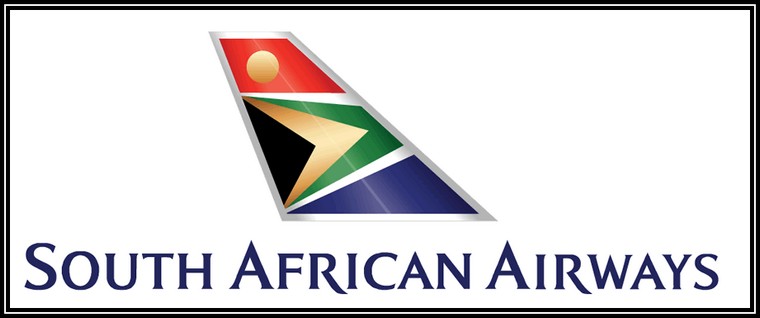
South African Airways (SAA), is proud to make dreams come true as today marks a significant day in the history of the airline. Two black African females for the first time in the airlines 88 years in existence operated a flight from Johannesburg to Cape Town. The flight was commandeered by Captain Annabel Vundla and First Officer Refilwe Moreetsi.
Captain Vundla is SAA's first Black African Female Captain and First Officer Moreetsi is not only a seasoned and experienced pilot, but also the first Black African female Management Pilot as she is also responsible for Fatigue Risk Management at the airline.
As part of October 2022 Transport Month, SAA is honoured to operate this historic flight. SAA Chairperson and Chief Executive Officer, says, “This is a milestone in the transformation of our national carrier. The airline continues to show leadership in transforming the aviation sector and overcoming inequalities in scarce skills and employment opportunities.”
SAA is a truly transformed airline with an ethnicity count of 63% Africans, 11% Coloureds, 10.5% Indians and 15.5% Whites.
“South Africans can feel proud of a national carrier that is truly represented of our diversity and we celebrate that. SAA is a non-discriminatory, non-racial, equal opportunities employer with a strategic transformational role,” says SAA Executive for Human Resources, Mrs Mpho Letlape.
Google Banner Ad
AIRBUS REPORTS NINE-MONTH (9M) 2022 RESULTS.
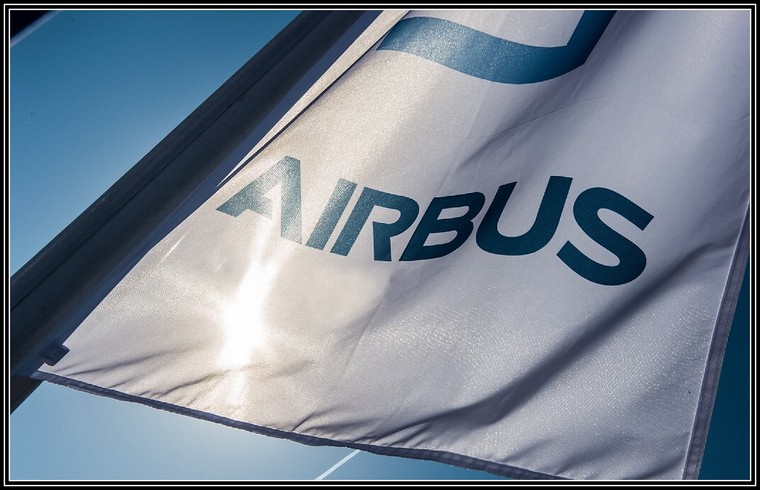
Airbus delivered a solid nine-month 2022 financial performance in a complex operating environment,” said Guillaume Faury, Airbus Chief Executive Officer. “The supply chain remains fragile resulting from the cumulative impact of COVID, the war in Ukraine, energy supply issues and constrained labour markets.
“Our strong focus on cash flow and the favourable dollar/euro environment have enabled us to raise our free cash flow guidance for 2022. The commercial aircraft delivery and earnings targets are maintained. Our teams are focused on our key priorities and in particular, delivering the commercial aircraft ramp-up over the coming months and years.”
Gross commercial aircraft orders increased to 856 (9m 2021: 270 aircraft) with net orders of 647 aircraft after cancellations (9m 2021: 133 aircraft). The order backlog amounted to 7,294 commercial aircraft at the end of September 2022. Airbus Helicopters registered 246 net orders (9m 2021: 185 units), with bookings well spread across programmes. Airbus Defence and Space's order intake by value was € 8.0 billion (9m 2021: € 10.1 billion), corresponding to a book-to-bill ratio slightly above 1. Third quarter 2022 order intake mainly related to services across the Division's portfolio.
Consolidated revenues increased to € 38.1 billion (9m 2021: € 35.2 billion). A total of 437(1) commercial aircraft were delivered (9m 2021: 424(2) aircraft), comprising 34 A220s, 340 A320 Family, 21 A330sand 42 A350s (2). Revenues generated by Airbus' commercial aircraft activities increased 8 percent year-on-year, mainly reflecting the higher number of deliveries including a favourable mix and the strengthening of the US dollar. Airbus Helicopters delivered 193 units (9m 2021: 194 units), with revenues rising by 9 percent mainly reflecting growth in services and a favourable mix in programmes. Revenues at Airbus Defence and Space increased 10 percent, mainly driven by the Military Aircraft business and the Eurodrone contract signature. Seven A400M airlifters were delivered in 9m 2022.
Consolidated EBIT Adjusted - an alternative performance measure and key indicator capturing the underlying business margin by excluding material charges or profits caused by movements in provisions related to programmes, restructuring or foreign exchange impacts as well as capital gains/losses from the disposal and acquisition of businesses - increased slightly to € 3,481 million (9m 2021: € 3,369 million).
EBIT Adjusted related to Airbus' commercial aircraft activities increased to € 2,875 million (9m 2021: € 2,739 million). It included the non-recurring positive impact from retirement obligations recorded in Q1, partly offset by the impact from international sanctions against Russia. It also reflects a less favourable hedge rate compared to 9m 2021.
On the A320 Family programme, production is progressing towards a monthly rate of 65 aircraft in early 2024 and 75 in 2025. The groundwork continues throughout all sites to secure a rate of 75 and adapt to the higher proportion of A321s in the backlog, ensuring all A320 Family Final Assembly Lines become A321 capable. Preparation for the upgrade of the second A320 FAL in Toulouse is underway. All three test A321XLRs have now flown, with the aircraft's entry-into-service expected to take place in Q2 2024. On wide-body aircraft, the Company is exploring, together with its supply chain, the feasibility of further rate increases to meet growing market demand as international air travel recovers.
Airbus Helicopters' EBIT Adjusted increased to € 380 million (9m 2021: € 314 million), partly driven by the growth in services and a favourable mix in programmes. It also reflects non-recurring elements booked in Q1, including the positive impact related to retirement obligations.
EBIT Adjusted at Airbus Defence and Space totalled € 231 million (9m 2021: € 284 million). This decrease mainly reflects the impairment related to the Ariane 6 launcher delay, the impact of rising inflation in some long-term contracts across the Division's portfolio and the consequences of international sanctions, partly offset by the positive impact related to retirement obligations booked in Q1 and Eurodrone.
On the A400M programme, development activities continue towards achieving the revised capability roadmap. Retrofit activities are progressing in close alignment with the customer. Risks remain on the qualification of technical capabilities and associated costs, on aircraft operational reliability, on cost reductions and on securing export orders in time as per the revised baseline.
Consolidated self-financed R&D expenses totalled € 1,965 million (9m 2021: € 1,919 million).
Consolidated EBIT (reported) amounted to € 3,552 million (9m 2021: € 3,437 million), including net Adjustments of € +71 million.
These Adjustments comprised:
€ +349 million related to the dollar pre-delivery payment mismatch and balance sheet revaluation, of which € +123 million were in Q3;
€ +33 million related to the A380 programme, of which € +40 million were in Q3;
€ -219 million related to the A400M programme, of which € -1 million were in Q3;
€ -48 million related to the Aero-structures transformation in France and Germany, of which € -15 million were in Q3;
€ -44 million of other costs including compliance, of which € -10 million were in Q3.
The financial result was € -306 million (9m 2021: € -172 million). It mainly reflects the net interest result of € -166 million as well as a negative impact from the revaluation of financial instruments, partly offset by the evolution of the US dollar and the revaluation of certain equity investments. Consolidated net income (3) was € 2,568 million (9m 2021: € 2,635 million) with consolidated reported earnings per share of € 3.26 (9m 2021: € 3.36).
Consolidated free cash flow before M&A and customer financing was € 2,899 million (9m 2021: € 2,260 million), reflecting the profit translated into cash and supported by a favourable foreign exchange environment. Consolidated free cash flow was € 2,502 million (9m 2021: € 2,308 million). The 2021 dividend of € 1.50 per share, or € 1.2 billion, was paid in Q2 2022 while pension contributions totalled € 0.5 billion in 9m 2022. On 30 September 2022, the gross cash position stood at € 22.5 billion (year-end 2021: € 22.7 billion) with a consolidated net cash position (4) of € 8.0 billion (year-end 2021: € 7.7 billion).
Outlook
As the basis for its 2022 guidance, the Company assumes no further disruptions to the world economy, air traffic, the Company's internal operations, and its ability to deliver products and services.
The Company's 2022 guidance is before M&A.
On that basis, the Company maintains its targets to achieve around 700 commercial aircraft deliveries and around € 5.5 billion of EBIT Adjusted in 2022. The Company now targets around € 4.5 billion of Free Cash Flow before M&A and Customer Financing in 2022.
Google Banner Ad
STARLUX TAKES DELIVERY OF FIRST A350
STARLUX 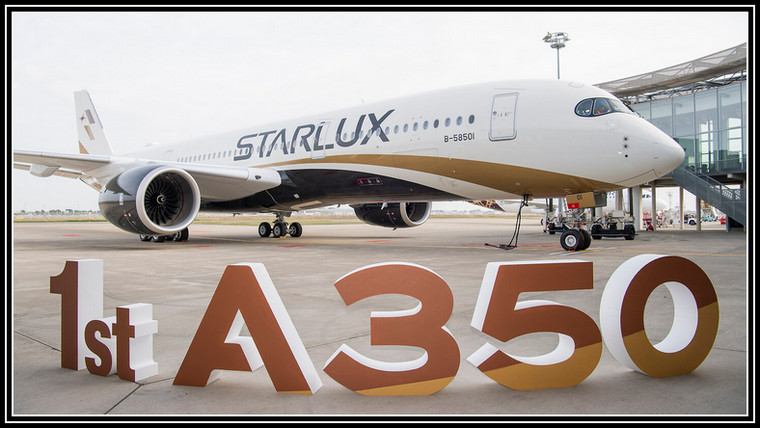
STARLUX has taken delivery of its first A350, becoming the latest operator of the world's newest wide-body. The aircraft is the first of 18 A350-900s set to join the carrier and will fly alongside the A330neo and A321neo at the airline in an all-Airbus fleet.
STARLUX has specified a luxurious four-class layout for its A350s, featuring four suites in First Class, 26 seats in Business Class, 36 in Premium Economy and 240 in Economy. The Airspace cabin on board the A350 features the latest developments in cabin configuration resulting in extra space to offer more comfort and personal room in every class. The A350's cabin is also the quietest of any aircraft flying today.
In addition, the aircraft features the latest in-flight entertainment systems and full connectivity. STARLUX will benefit from the highest levels of operational efficiency offered by the A350, with a reduction of fuel consumption and carbon emissions of 25% compared with older generation aircraft in the same size category.
"This delivery is a milestone for STARLUX Airlines. The A350-900 is our first large wide-body aircraft, which will allow STARLUX to open markets for longer routes and this also marks the next step for our partnership with Airbus, as there will be 17 more A350s deliveries in the future. With the addition of the A350-900, the STARLUX fleet now can cover short, mid, and long range flights, providing service to passengers outside of Asia,” said Glenn Chai, CEO of STARLUX Airlines.
Christian Scherer, Airbus Chief Commercial Officer and Head of Airbus International added: “With an all-new generation, all-Airbus fleet, STARLUX is introducing new levels of comfort and efficiency to the long-haul premium market. Passengers will enjoy a seamless travel experience featured by Airbus' appealing Airspace cabin design. Flying together, the A350, A330neo and A321neo perfectly play out all the advantages of Airbus' unique fleet commonality, driving operational cost down while providing all flexibility to match capacity with demand."
STARLUX's A350 fleet will begin operations within the Asia-Pacific region before moving to trans-pacific routes.
Globally the A350 has registered a total of over 900 firm orders from over 50 customers, with close to 500 delivered.
ALASKA AIRLINES ORDERS 52 BOEING 737 MAX JETS TO FURTHER MODERNISE THEIR FLEET.

Boeing (NYSE: BA) and Alaska Airlines today announced the carrier is expanding its 737 MAX fleet with an order for 52 airplanes, exercising options for an additional 42 737-10 and 10 737-9 jets. With the order, the airline is advancing its efforts to build one of the most efficient and sustainable fleets in the industry.
"This investment secures aircraft to optimise our growth through the next decade, which we know will be a formidable competitive advantage," said Alaska Airlines CEO Ben Minicucci. "We're proud of the strong financial foundation that uniquely positions Alaska to make this commitment to our future and of the fantastic partnership we share with our hometown aircraft manufacturer at Boeing."
The 737 MAX family provides the carrier with enhanced reliability and improved fuel efficiency to help meet its short- and long-term growth strategy. With the new agreement, Alaska's unfilled order book for 737 MAXs totals more than 100 jets. By the end of 2023, the airline expects to have an all-Boeing mainline fleet.
"As Alaska Airlines sustainably grows its fleet, the 737 MAX family offers environmental performance and flexibility to expand service across its route network," said Stan Deal, president and CEO of Boeing Commercial Airplanes. "Built in our Renton factory near Alaska's headquarters in Washington State, these airplanes will carry passengers to destinations for years to come."
Alaska Airlines currently operates 35 737-9 airplanes, which the airline configures to seat 178 passengers. With Boeing's largest and most efficient single-aisle jet, the airline will uitilisethe 737-10 to provide further route flexibility and service. The 737-10 can seat 204 passengers in a two-class configuration with a range of 3,100 nautical miles. The737 MAX reduces fuel use and emissions by 20% compared to the airplanes it replaces.
As a leading global aerospace company, Boeing develops, manufactures and services commercial airplanes defence products and space systems for customers in more than 150 countries. As a top U.S. exporter, the company leverages the talents of a global supplier base to advance economic opportunity, sustainability and community impact. Boeing's diverse team is committed to innovating for the future, leading with sustainability and cultivating a culture based on the company's core values of safety, quality and integrity. Join our team and find your purpose at boeing.com/careers.
INTERNATIONAL AIRLINES GROUP (IAG) SHAREHOLDERS APPROVE BOEING 737 ORDER
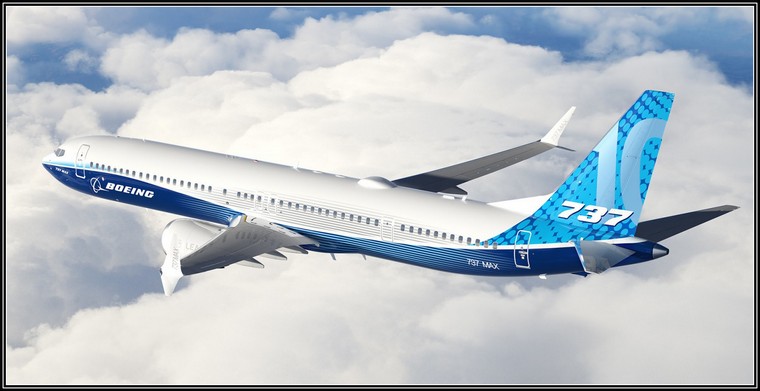
International Airlines Group (IAG) has announced that its shareholders approved an agreement with Boeing [NYSE:BA] to order a total of 50 737-8-200s and 737-10s, plus 100 options.
Boeing and IAG announced the agreement that was subject to shareholder approval in May 2022. The firm order for 50 737s will be reflected on Boeing's Orders & Deliveries website in November.
"We welcome today's decision by IAG's shareholders to approve a firm order for 50 737-8-200s and 737-10s, with options for 100 mor and we look forward to working with IAG on reintroducing the 737 in to the Group's fleets," said Ihssane Mounir, Boeing's Senior Vice President of Commercial Sales and Marketing.
The largest model in the family, the 737-10 seats up to 230 passengers in a single-class configuration and can fly up to 3,300 miles. The fuel-efficient jet can cover 99% of single-aisle routes, including routes served by 757s.
The 737-8-200 will enable IAG to configure the airplane with up to 200 seats, increasing revenue potential and reducing fuel consumption.
The 737 incorporates the latest-technology CFM International LEAP-1B engines, Advanced Technology winglets and other improvements to deliver the highest efficiency, reliability and passenger comfort in the single-aisle market. The 737 family of airplanes is on average 14% more fuel-efficient than today's most efficient Next-Generation 737s and 20% more efficient than the original Next-Generation 737s when they entered service.
IAG CONFIRMS ORDER FOR AN ADDITIONAL 37 A320NEO FAMILY AIRCRAFT
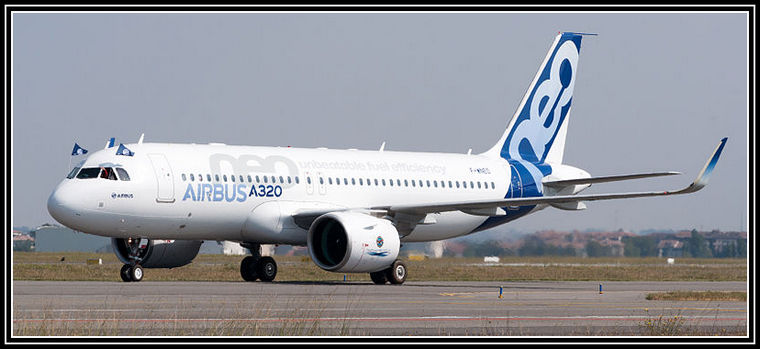
International Airlines Group (IAG) has confirmed an order for 37 additional A320neo aircraft, following shareholder approval. The latest order follows earlier agreements for 22 A320neo Family (17 A320neos, 5 A321neos) announced in March and June 2022, taking the total for the year to 59 single aisle aircraft.
“IAG operates Airbus aircraft extensively in its fleet making it one of the largest Airbus customers globally. These latest generation aircraft will be a key part of IAG's plan to achieve net zero emissions by 2050”, said Christian Scherer, Chief Commercial Officer and Head of Airbus International.
The A320neo Family incorporates the very latest technologies including new generation engines and Sharklets, which together deliver at least 20 percent fuel saving. With more than 8,500 orders from more than 130 customers, the A320neo Family is the world's most popular aircraft.
Google Banner Ad

|
                     |























